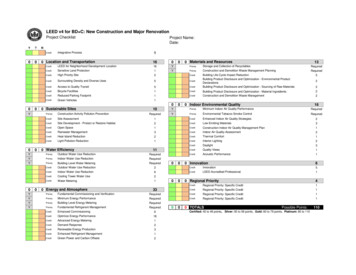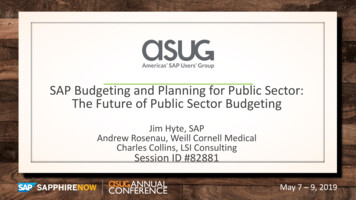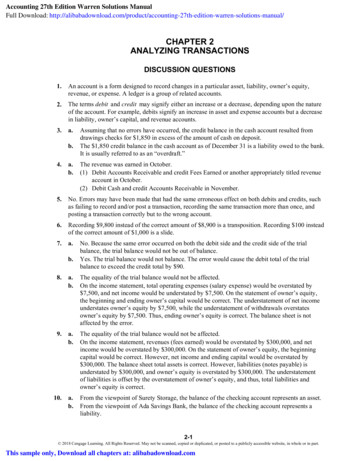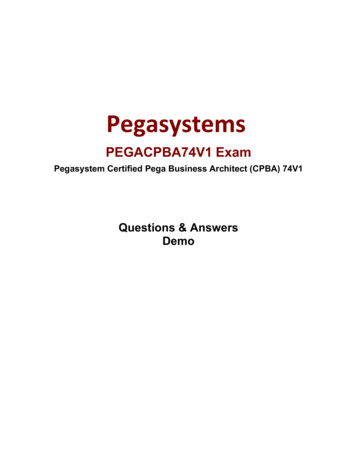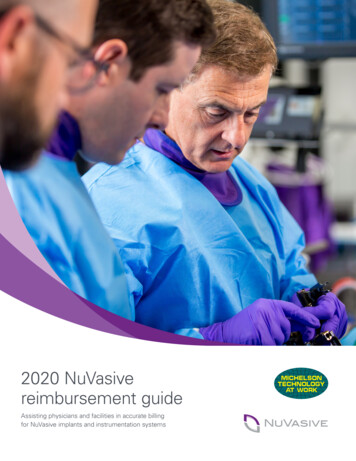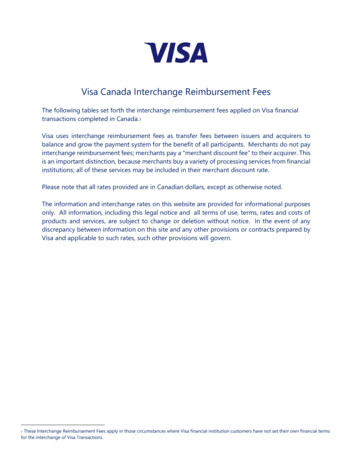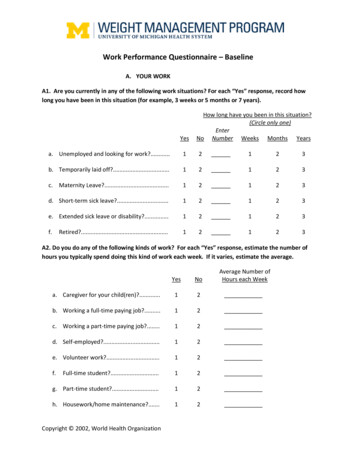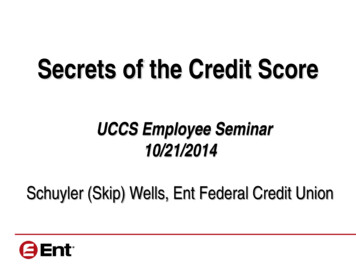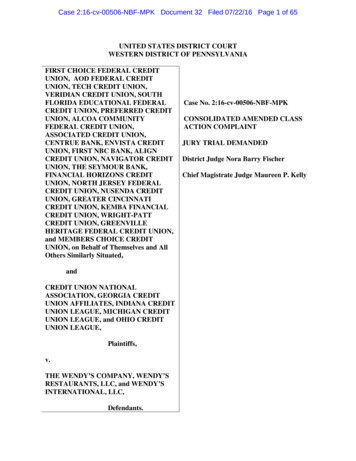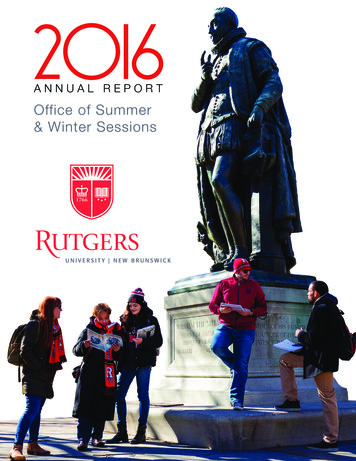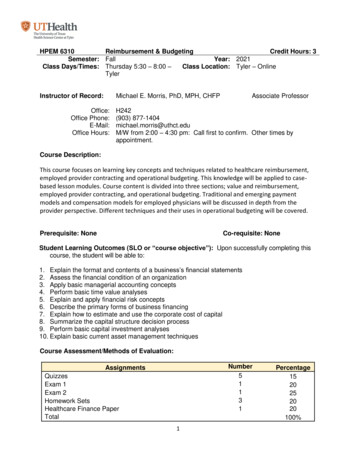
Transcription
HPEM 6310Reimbursement & BudgetingCredit Hours: 3Semester: FallYear: 2021Class Days/Times: Thursday 5:30 – 8:00 –Class Location: Tyler – OnlineTylerInstructor of Record:Michael E. Morris, PhD, MPH, CHFPOffice:Office Phone:E-Mail:Office Hours:Associate ProfessorH242(903) 877-1404michael.morris@uthct.eduM/W from 2:00 – 4:30 pm: Call first to confirm. Other times byappointment.Course Description:This course focuses on learning key concepts and techniques related to healthcare reimbursement,employed provider contracting and operational budgeting. This knowledge will be applied to casebased lesson modules. Course content is divided into three sections; value and reimbursement,employed provider contracting, and operational budgeting. Traditional and emerging paymentmodels and compensation models for employed physicians will be discussed in depth from theprovider perspective. Different techniques and their uses in operational budgeting will be covered.Prerequisite: NoneCo-requisite: NoneStudent Learning Outcomes (SLO or “course objective”): Upon successfully completing thiscourse, the student will be able to:1. Explain the format and contents of a business’s financial statements2. Assess the financial condition of an organization3. Apply basic managerial accounting concepts4. Perform basic time value analyses5. Explain and apply financial risk concepts6. Describe the primary forms of business financing7. Explain how to estimate and use the corporate cost of capital8. Summarize the capital structure decision process9. Perform basic capital investment analyses10. Explain basic current asset management techniquesCourse Assessment/Methods of Evaluation:Number51131AssignmentsQuizzesExam 1Exam 2Homework SetsHealthcare Finance PaperTotal1Percentage1520252020100%
Linked MPH Program Learning Outcomes:The student learning outcomes listed above address the following MPH Program PLOs: PLO1 - The student will demonstrate mastery in each of the five core knowledge areas inpublic health: Biostatistics, Epidemiology, Social & Behavioral Sciences, Health Policy andManagement, and Environmental Health Sciences. PLO3 - The student will demonstrate proficiency in using multiple informational resources togather, analyze, apply and report solutions to public health problems with a special emphasison rural community health. PLO4 - The student will demonstrate proficiency in English communication in both oral (publicspeaking) and written forms as they pertain to conveying key concepts in public health. PLO5 - The student will demonstrate proficiency in using computers and other forms of digitaltechnology and media as they pertain to research, office management and public healthissues. PLO6 - The student will demonstrate independent and critical thinking skills.Linked MHA Program Learning Outcomes:The student learning outcomes listed on pp. 1 and 2 address the following MHA Program PLOs: PLO A.1 - The student will identify appropriate sources and gather information, effectively andefficiently. PLO A.2 - The student will appraise literature and data critically that enhances communityhealth. PLO A.3 - The student will develop, understand and use data from performance, surveillanceor monitoring systems. PLO A.5 - The student will understand and apply basic statistical methods relevant to publichealth and health administration practice. PLO A.10 - The student will implement a decision-making process that incorporates evidencefrom a broad analysis that includes uncertainty, risk, stakeholders, and organizational values. PLO B.1 - The student will speak and write in a clear, logical, and grammatical manner in formaland informal situations; prepare cogent business presentations; facilitate an effective groupprocess. PLO B.2 - The student will receive, process, and respond appropriately to information conveyedby others. PLO B.3 - The student will perceive and respond appropriately to the spoken, unspoken, orpartly expressed thoughts, feelings, and concerns of others.Required Textbook:HFMA (2021) Certified Revenue Cycle Representative Course. Accessed on line through your HFMAaccount. (an explanation of the process is included in the class canvas)Thomas K. Ross (2019) A Comprehensive Guide to Budgeting for Health Care Managers. First Edition.Jones and Bartlett Learning. Burlington. MA.Other Required Readings: As assigned. These articles will be posted on Canvas in the week to whichthey are relevant.2
**It is required that you join HFMA as a student member, you will be utilizing multiple resourcesfrom them, including the Certified Revenue Cycle Representative course .html#benefitsAssignment Descriptions:QuizzesShort (5 to10 question) quizzes will be posted in Canvas and are used throughout the CRCRcomponent of the class. The questions will be multiple choice and will focus on the content of thematerial covered up until that point in the course with an emphasis on the most recent material. Theintent is to help you prepare for Exam 1 (the CRCR certification exam). Quizzes must be completedby 11:59 pm of the Sunday following the Monday in which they are listed in the syllabus.Homework SetsThese assignments will vary in content from solving computational problems at the end of the bookchapters to completing a business case analysis. Exams are due by 11:59 pm of the second Sundayfollowing the Monday in which they are listed in the syllabus.ExamsThe two exams will cover material covered in the readings, lectures and in class exercises. The firstexam will cover material up to week 6 of the course (the end of the CRCR modules) and is the officialcertification exam from HFMA. The second exam will cover material from week 7 to the end of the classand will an exam that I create. Exams are due by 11:59 pm of the Sunday following the Monday inwhich they are listed in the syllabus.Healthcare Finance PaperThe areas of healthcare payment, costing, and budgeting are enormous topics that could easily eachbe courses. Because of this fact, the healthcare finance paper assignment is intended to allow studentsto take a deeper look at a topic within those areas that is of interest to them. The paper should be 12to 15 pages single spaced utilizing APA style referencing. It is the intent of this assignment that thestudent addresses the topic that they chose providing an explanation of the topic, a discussion of theimportance of the topic to provider or payor organizational financial condition/performance, andconsideration of changes/evolutions that are on the horizon.Course Content:ScheduleWeek 1 (August 23)Assigned ReadingsThe Patient Centric Revenue Cycle Part ICRCR Unit 11.1 thru 1.6Week 2 (August 30)The Patient Centric Revenue Cycle Part IICRCR Unit 11.6 thru 1.10Quiz #13
Week 3 (September 6)Pre-services Financial CareCRCR Unit 22.1 thru 2.7Quiz #2Week 4 (September 13)Point of Service Financial CareCRCR Unit 33.1 thru 3.7Quiz #3Week 5 (September 20)Post Service Financial Care Part ICRCR Unit 44.1 thru 4.5Quiz #4Week 6 (September 27)Post Service Financial Care Part IICRCR Unit 44.5 thru 4.9Quiz #5Week 7 (October 4)Exam 1 (Due Sunday October 10th 11:59 pm)NoneWeek 8 (October 11)Assessing Managed Care ContractsCanvas Readings 8Week 9 (October 18)Provider Compensation ModelsCanvas Readings 9Homework Set #1Week 10 (October 25)Management and BudgetingCanvas Readings 104
Week 11 (November 1)Output Forecasts and Revenue BudgetsCanvas Readings 11Homework Set #2Week 12 (November 8)Budgeting Techniques Part ICanvas Readings 12Week 13 (November 15)Budgeting Techniques Part IICanvas Readings 13Homework Set #3Week 14 (November 22)Budgeting Techniques Part IIICanvas Readings 14Week 15 (November 29)Budgeting Techniques Part IVCanvas Readings 15Healthcare Finance Paper DUEWeek 16 – (December 6)---Exam 2 (On-line) Other Class Policies:Adding/Dropping:The official deadline for adding and dropping courses is as published in the academic calendar andGraduate Bulletin (typically the day before Census Day). However, students are strongly encouragedto meet with their graduate advisor or the Program Coordinator prior to adding/dropping courses.Movement into and out of classes after the 4th class day requires approval of the Program Director.Students can drop until mid-semester without a WP or WF. Drops after mid-semester require approvalof the Dean. Each student is responsible for their own enrollment status with the university.Disability Accommodations:UTHSCT abides by Section 504 of the Rehabilitation Act of 1973 and the Americans with DisabilitiesAct, which mandate reasonable accommodations be provided for students with documenteddisabilities. If you have a disability and may require some type of instructional and/or examinationaccommodations, please contact me early in the semester so that I can provide or facilitate provisionof accommodations you may need. If you have not already done so, you will need to register with the5
Student Services Office (located on the UT Tyler Campus). You may call 903-566-7079 for moreinformation.Note: The Instructor retains the right to change this syllabus.6
HFMA (2021) Certified Revenue Cycle Representative Course. Accessed on line through your HFMA account. (an explanation of the process is included in the class canvas) Thomas K. Ross (2019) A Comprehensive Guide to Budgeting for Health Care Managers. First Edition. Jones and Bartlett Learning. Burlington. MA. Other Required Readings: As assigned .
